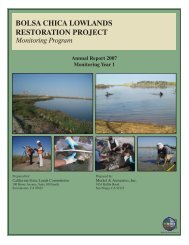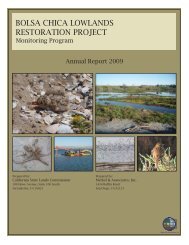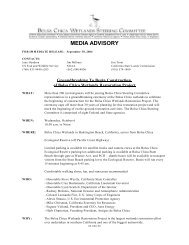1.1 MB pdf - Bolsa Chica Lowlands Restoration Project
1.1 MB pdf - Bolsa Chica Lowlands Restoration Project
1.1 MB pdf - Bolsa Chica Lowlands Restoration Project
You also want an ePaper? Increase the reach of your titles
YUMPU automatically turns print PDFs into web optimized ePapers that Google loves.
SECTION 3: ANALYSIS<br />
copper were detected in all five stilt egg samples. Other metals were detected with much<br />
lower frequency. Terrestrial plant tissue also had high metal detect frequencies. Almost all<br />
small mammal tissues had metal detects. Mercury, cobalt, and cadmium were the only<br />
metals not found in every sample. Several metals were detected in aquatic invertebrate<br />
samples, with only a few being detected in less than 50 percent of samples.<br />
Pesticides in sediment/soil were low except for 4’4-DDE and 4’4-DDD. Stilt eggs had a high<br />
number of detects for BHC-beta, dieldrin, 4’4-DDT and 4’4-DDE. Aldrin was also detected<br />
in small mammal tissue in 9 of 12 samples.<br />
PAHs and semi-volatiles were detected in various media, but numbers of detects were low.<br />
Waste oil was found in 54 percent of sediment/soil samples.<br />
Seasonal Ponds<br />
Metals, pesticides, PAHs, and semi-volatiles were all found in the Seasonal Ponds area.<br />
Metals were detected in high numbers in sediment/soil samples. Surface water samples<br />
were found to contain some metals although detection was infrequent in most cases. Copper<br />
and zinc, however, were found in all samples. All metals except nickel were found in all<br />
three stilt egg samples. Terrestrial plant tissue was also found to contain several metals.<br />
While sample size for small mammals is only two, the frequency of detection for metals was<br />
almost always 100 percent.<br />
Pesticide detects were relatively infrequent in the seasonal ponds except for 4’4-DDE in<br />
sediment/soil (25 of 49 samples).<br />
Both PAHs and semi-volatiles were detected, but frequencies were low.<br />
Surface water samples had TPH-diesel and waste oil detects in 100 percent of the samples.<br />
3.1.3 Background Evaluation<br />
An evaluation of inorganic constituents in onsite sediments was conducted for the <strong>Bolsa</strong><br />
<strong>Chica</strong> <strong>Lowlands</strong>. This evaluation was intended to establish the background (ambient) levels<br />
for metals, as described below. Normally, a background evaluation is conducted by a<br />
statistical comparison of the levels of inorganic constituents from samples collected on site<br />
to a body of data representative of local conditions but which are unaffected by site-related<br />
activities (Cal/EPA, 1997). The background values were used in evaluating potential sources<br />
and spatial distribution of COPECs (Section 3.1.4.1) and for developing site-specific sediment<br />
toxicity values using regression analyses (Section 3.2.1.3). They will also be used in the future<br />
to assist in the development of cleanup goals, which will be part of a separate deliverable.<br />
They were not used to screen out chemicals in the COEC selection process. Specifically, all<br />
detected chemicals were taken through the risk screening process to determine COECs.<br />
Chemicals were not excluded from the risk screening based on comparisons to background.<br />
Given the unique ecological and geologic conditions associated with the <strong>Bolsa</strong> <strong>Chica</strong><br />
<strong>Lowlands</strong>, the Technical Committee decided that the background evaluation would be<br />
based entirely upon analysis of sediment samples collected onsite. To complete the<br />
background evaluation for the <strong>Lowlands</strong>, the analytical results from the sediment samples<br />
associated with the ERA Sampling and Analyses (including samples from the proposed<br />
ERA REPORT 3-12 SAC/143368(003.DOC)<br />
7/31/02






